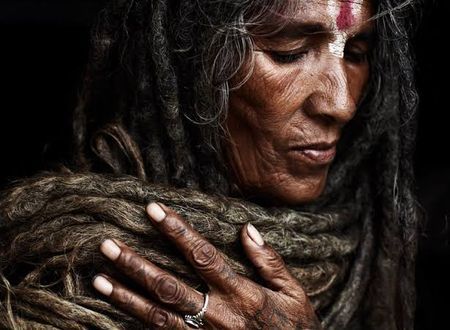We used to have an amazing relationship. We dated for four years before we got married. I don’t remember having any arguments back then. I had no doubt that we were soul mates. But today, after just three years of marriage we are on the verge of divorce. I never thought this could happen to me. I’m sick and tired of arguing and asking and bickering. He never wants to spend time with me. He doesn’t listen to me. What went wrong, Swami? Why do marriages end up like this?
This is an abstract of what I received from a distressed reader a few weeks ago. I know what you mean, marriages are tricky and a lot of them end up in divorce. It needn’t be this way. Let me tell you a little story:
Once upon a time, there was a little girl. She and her widower father used to perform a difficult feat in a circus. The father would balance a 20-foot-long bamboo pole on his forehead and the girl would climb up the pole eventually standing on it on one foot (as easy as any marriage, basically). Once done, the father would walk around while the girl stayed on top of the pole. He worried about his daughter’s safety every time they did this act.
“I’ve told you a million times,” he said to her, “that, you must keep an eye on me. I’m always watching you so I may balance the pole. You should watch me as well so we may avoid a casualty. You are all I have.”
“No, father, no,” she replied wisely. “During the performance, you take care of your part and I’ll take care of mine. We must not distract ourselves by watching each other. You focus on what you have to do. Stay very stable, very alert and I’ll concentrate on what I must do. This is the only way we are going to pull off this feat every time.”
The father was not convinced so they approached Buddha who concluded that the girl was right.
In a marriage, or in any other relationship for that matter, you must take responsibility for your own actions. The other person is not responsible for making you feel happy and good all the time. Let me ask you a question: why did you get married? Did you marry because you wanted to fill someone’s life with happiness or because you wanted to have someone in your life? Perhaps both, but mostly the latter. Besides, your definition of filling the other person’s life with happiness may be very different from theirs. You may want to fill her fridge with mangoes whereas she may want papayas.
Most people marry with the primary intent of satisfying their own needs. You want someone who can take care of you, be there for you, someone with whom you can share your everything and so on. There is nothing wrong with it. It’s just that it’s a little impractical at times. When a marriage becomes a contract of responsibility in which the other person is constantly watching out for you, such a marriage is doomed to failure. Why? Because one day he or she will get tired. And, when they get tired, they’ll look for other avenues of happiness and joy, they’ll like to be elsewhere where they can rest and recuperate.
A sense of tiredness creates distance in a relationship.
The major difference between courtship and marriage is the expectations two partners have of each other. While dating, you make requests to each other and you give each other personal space. You probably see each other over the weekends or even if you are in a live-in relationship, you maintain other meaningful relationships too. During the courtship, you ask your partner if he or she would like to join you for dinner, for example. If they say no, you don’t get upset or start yelling. Very lovingly, you say, “Okay, no worries. We’ll do it some other day,” and so on.
But after marriage, this soft tone is taken over by a sense of ownership, of possessiveness. When requests turn into demands is when a marriage starts to come apart at the seams. A demanding relationship is not the same as a relationship full of demands. I would like to quote (with minor changes) Marshall Rosenberg:
Our requests are received as demands when others believe they will be blamed or punished if they do not comply. When people hear a demand, they see only two options: submission or rebellion. Either way, the person requesting is perceived as coercive, and the listener’s capacity to respond compassionately is diminished.
The more we have in the past blamed, punished, or “laid guilt trips” on others when they haven’t responded to our requests, the higher the likelihood that our requests will now be heard as demands. To tell if it’s a demand or a request, observe what the speaker does if the request is not complied with. For example:
Jack says to his friend Jane, “I’m lonely and would like you to spend the evening with me.”
Is that a request or a demand? The answer is that we don’t know until we see how Jack treats Jane if she doesn’t comply.Suppose she replies, “Jack, I’m really tired.”
If Jack then remarks, “How typical of you to be so selfish!” his request was in fact a demand. Instead of empathizing with her need to rest, he has blamed her.
(Nonviolent Communication: A Language of Life)
Demands destroy a marriage.
If you really want to make your marriage work then you must forget all about being possessive. Give freedom to each other so that you may create a positive environment that’s conducive to mutual growth. In that free environment, love and friendship will flourish like creepers do on strong trees. Of all the people you miss, do you miss those who were happy and fun to have around or those who were demanding and clingy?
If you want a hukum mere aaka, your wish is my command, type of partner then I suggest you get a magical lamp like the one Alladin had (pictured above).
If you are married to a human, however, and you want your partner to love you, miss you and spend time with you then you will have to respect their personal space. You’ll have to set them free and you’ll have to stop making demands. Too many have-tos, I know (I never said, marriage was easy.) While marriage or love is about being yourself, it is not so at the cost of the other person. Sometimes, in the liberties we take, we hurt the other person. Bad idea. How do you carry yourself at work? Do you argue with your bosses or colleagues? Hopefully not. Why? Because you know you have to behave a certain way or your employment will end.
The scene is not much different at home. A common view is that because I work all day, I don’t have to do anything when I get home. This is a mistake. Marriage too requires a lot of work. Marriage is also about a commitment you make to yourself and each other about how you are going to conduct yourself and your affairs (pun intended). Together and individually. Or, the other way is to let loose. Give each other freedom and learn to lead individual lives outside of work (and home) as well. If you are positive and happy, and not controlling and demanding, your partner will want to spend more time with you. What if he still doesn’t, you ask? Then at least, you will have peace at heart that you are not hurting anyone.
Because, let me tell you, out of everything you can have in this world, what people want the most is not love, friendship or wealth. What they want is freedom. It’s priceless. People acquire wealth so they may have the freedom to do a lot of things. Even the most insecure or possessive people who cling to someone, they do that so they may feel free to be however they want to be with that person. Think about it: what do you hope to accomplish by clipping someone’s freedom? If you want to experience love, set them free.
When a bird feels safe and happy in a nest, no matter how far it flies off, it’ll always come back and perch on the same tree and sleep in the same nest. We are the most intelligent but most troubled race because we are not just territorial, possessive and self-centered (all animals are), we are also manipulative. We think we can dupe the other person or control them. We think we can somehow give them so much that they would never want anything or anyone else in life. Wishful thinking. Love knows no manipulation.
The birds fly free in the sky, cows graze freely on the prairies, lions roam majestically in the woods, bees flit from one flower to another without fear, and, we, the most advanced race, want a sense of belonging by taking away the most fundamental right of every human being? Freedom. No wonder we are so destructive too. The opposite of freedom is not bondage, it’s destruction. Whatever you want to destroy, take away the freedom from it. Each one of us is a sovereign of our own world.
Love only knows care, it only knows service and ultimately, it only understands freedom, for, freedom is the only emotion that completes you eventually, that makes you feel human. It is utterly liberating. And please, the phrase is soul mate, not sole mate. And, by sole I don’t mean the undersurface of your foot, I’m solely using it as an adjective.
Someone asked Mulla Nasrudin when he was elected as a mayor, “Sir, do you drink alcohol?”
“Is that an accusation or invitation?” Mulla said.
“It’s just a question, sir, ” he replied.
“Oh,” Mulla chuckled. “What’s the fun then?”
I could have answered my reader’s question in one word: divorce. Or in two words: grow up. Or in three words: this is marriage. Or in four words: what were you expecting? But, I thought, what’s the fun then?
Don’t take yourself too seriously; it’s a disease.
Peace.
Swami
Editorial Note
Marriages fail. This is an inevitable fact of life. But rarely do people get married with the intention of breaking up. After all, a marriage signifies lifelong commitment: a vow to look after one another, care for each other and love each other until death.
So, what goes wrong then? Why are the same people who are hopelessly in love one day, bickering bitterly the next?
As playwright Nora Ephron writes in her book, Heartburn, on her failed marriage, “You fall in love with someone and part of what you love about them are the differences between you; and then you get married and the differences start to drive you crazy.”
In a nutshell, this is why marriages fail – when we stop accepting the other person as they are and begin expecting them to behave according to our will.
Course
Art of Meditation
Free yourself from suffering and live life to the fullest. Learn the yogic technique of meditation in 4 days (and master it over a lifetime)
The FAQs below provide more insight on the signs of a failing marriage, what one can do to nurture a healthy relationship with their partner and how, in the end, it is only our relationship with God that matters.
A person’s heart should be so hidden in God that their partner has to seek Him just to find them – Max Lucado, American author and pastor
That’s true love.
What is the secret of a happy marriage?
Marrying someone is like signing an employment contract, it shows you have made a commitment. And building compatibility in this commitment is a mutual effort. Just as to protect our health we watch what we put into our body, to protect and nurture a relationship, we need to be mindful of what we feed it.

Put a sincere effort, noble intentions, kind words, honest actions into your relationship, and you’re rewarded accordingly. Sometimes, what can’t be accomplished by quarrelling, arguing, bickering, and threatening is easily attained by loving and inspiring the other person, especially for a happy marriage.
Hence, I guess, in trying times, rather than proving your point, ask yourself, “What can I do to inspire this person to see my perspective?” Or even better, “What do I need to do to see his/her perspective?” That’ll make all the difference.
Too often, marriages fail because we fail to see the other person’s perspective. And the real secret?
Let Kabir tell you in the Secret of a Happy Marriage.
What are the 3 signs of an abusive marriage?
Sometimes, marriages fail because of abuse. And it’s not your fault. An abuser must be shunned.
Not sure if your partner is abusive? Here are some signs:
- Most abusive partners come across as loving and respectful at the beginning of a new relationship, but, as time goes by, they become increasingly condescending, even manipulative.
- In most abusive relationships the dominating partner is often unpredictable and inconsistent. You don’t know what will tick them off.
- An abusive partner rarely changes his or her ways. When they are fickle and discordant, they’ll remain like that with you.
If you don’t move out of an abusive relationship, you are doing yourself great disservice. And, if you just can’t call it quits then you must develop your personal method to keep your sanity.
What about the impact of an abusive marriage on your child? Single Parents and Broken Marriages tells you.
What are the 5 types of failed marriages?
How do you know if your marriage can work? Should you be putting your effort to try and pull on, or move on instead? Is there a reason why marriages fail?

There is no definitive answer as each individual is unique and each marriage, a little different. I can, however, offer you five analogies, metaphors if you will, of a broken marriage:
- Fresh Wound
- Dented Car
- Birth Mark
- Broken Vase
- Malignant Tumor
I wish there was a ‘u’ in marriage rather than an I. Perhaps, things would have been easier. Heavens! there is no ‘v’ in it either. No wonder, it requires constant care. No wonder marriages fail.
Somewhere between mar, rage and age, sits the lonely I. I is in marriage, but it is not about I, if it was, it would be more a mirage.
Read in detail about the five analogies in Broken Marriage of 5 Types.
Can a marriage give us ultimate happiness in life?

After meeting thousands of people, I’ve observed that the most common cause of grief is not people’s expectations from their relationships but generally the relationship itself.
All worldly relationships are bound to have challenges, predominantly because we want the other person to fulfill us (and the other wants the same from you). Having said that, I’m not suggesting that relationships are bad or that you shouldn’t be in one. A great deal of our happiness depends on the quality of our personal and social interactions, after all.
The truth still remains that if we don’t know how to keep ourselves happy, no one else will ever be able to do that for us. There’s only so much the other person can give you. Ultimately, your happiness depends on your selfless karma as well as on how you treat yourself.
The beautiful story of Pingala the prostitute says as much – The Center of Your Life is God.
Do marriages fail when one partner begins walking the spiritual path?
Marriages fail when we change and we expect our partner to change with us, instantly. But that’s not how a relationship works.
The video below speaks about how a householder is the biggest sanyasi. Attaining nirvana is possible while raising a family.

Timeline:
- 0:39: Balance your marriage
- 3:31: Change is another name for life
- 5:02: What is the difference between love and surrender?
- 6:34: How can one attain moksha while being a householder?
A GOOD STORY
There were four members in a household. Everybody, Somebody, Anybody and Nobody. A bill was overdue. Everybody thought Somebody would do it. Anybody could have done it but Nobody did it.
Don't leave empty-handed, consider contributing.It's a good thing to do today.









Comments & Discussion
8 COMMENTS
Please login to read members' comments and participate in the discussion.